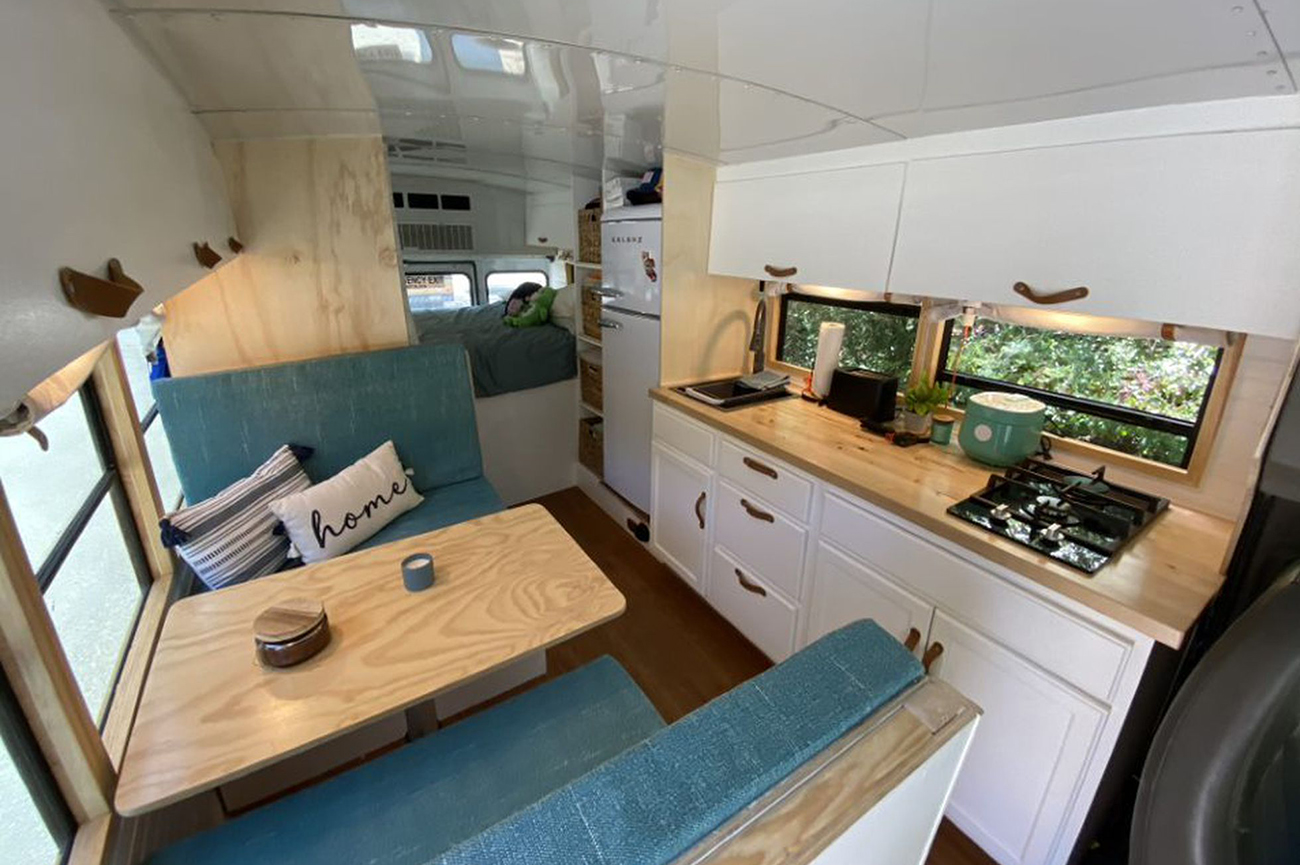Living in a bus
Living in a bus is not a typical way of life, but it is becoming increasingly popular among those who value freedom, adventure, and sustainability. For some people, the idea of living in a bus seems crazy or uncomfortable. However, for others, it represents an opportunity to simplify their lives and live more intentionally. Living in a bus can provide a sense of flexibility that traditional housing cannot offer.
It enables individuals to travel anywhere they desire without being tied down to one location or paying rent for an apartment or house. Additionally, converting a bus into a home can be an exciting and creative process that allows individuals to design their living space according to their unique needs and preferences. Overall, living in a bus offers plenty of benefits for those who are seeking unconventional living arrangements.
A Journey Through Bus Conversions as a Living Space
The history and evolution of bus conversions as a living space dates to the 1950s, when people began converting old buses into recreational vehicles. These early conversions were primarily used for camping and traveling purposes. However, in the 1960s and 1970s, the hippie movement popularized bus living as a lifestyle choice. Many young people chose to live in converted buses as a form of rebellion against societal norms and materialism.
In recent years, bus conversions have become more mainstream due to the rise of tiny house living and van life culture. With advancements in technology and materials, it is now easier than ever to convert a bus into a comfortable home on wheels.
One of the most significant benefits of living in a bus is the cost-effectiveness it offers compared to traditional housing. The initial cost of purchasing a bus and converting it into a liveable space can be expensive, but it is still significantly cheaper than buying or renting a traditional home. Additionally, living in a bus eliminates many ongoing expenses associated with owning or renting a house, such as property taxes, utility bills, and maintenance costs.
Bus living as Lifestyle
Living in a bus also encourages minimalism and frugality as there is limited space to accumulate unnecessary possessions. This lifestyle change can lead to significant savings on household expenses and promote sustainable living habits. Overall, living in a bus provides an affordable alternative for those seeking financial freedom or looking to reduce their environmental impact without compromising comfort and convenience.
Living in a bus offers a unique sense of freedom and mobility that is hard to find in traditional housing. The ability to travel wherever and whenever you want without the constraints of a permanent home is truly liberating. You can explore new places, meet new people, and experience distinct cultures in a way that is not possible when tied down by rent or mortgages.
Living in a bus also allows you to disconnect from the stresses of modern life and reconnect with nature. You can park your home in some of the most beautiful locations, wake up to breath-taking scenery, and enjoy outdoor activities like hiking and camping. The freedom and mobility that comes with living in a bus truly opens a world of possibilities for those willing to take the leap.
Living in a bus provides a unique opportunity to adopt a minimalist lifestyle. Downsizing possessions is a necessary step to fit comfortably into the limited space of a bus. This process can be challenging, but it offers many benefits such as simplifying your life and reducing stress. Minimalism also allows you to focus on experiences rather than material possessions.
You become more mindful of what you truly need and value, leading to greater appreciation for the things you do have. In addition, living with less helps reduce your carbon footprint and contributes to a more sustainable way of life. Overall, downsizing possessions for bus living encourages simplicity and intentional living which can lead to greater happiness and contentment.
Transforming a Bus into a Home: A Sustainable Solution
Converting a bus into a home can offer numerous sustainability and environmental benefits. Firstly, it is a form of upcycling, as old buses that may have been discarded or sold for scrap are given new life and purpose. This reduces waste and emissions associated with manufacturing new materials for traditional homes. Secondly, living in a bus can reduce one’s carbon footprint by promoting a minimalist lifestyle with limited space for possessions, encouraging conscious consumption and waste reduction.
Transforming a bus into a home is a sustainable solution that can help reduce traffic congestion and improve air quality. It is a cost-effective and eco-friendly way to make transportation more accessible and efficient.
Additionally, solar panels can be installed on the roof of the bus to generate renewable energy and reduce dependence on non-renewable sources. Overall, converting a bus into a home is an environmentally conscious choice that promotes sustainability through upcycling, minimalism, and renewable energy generation.
Community building among the bus-dwelling community is a unique aspect of living in a bus. Bus dwellers often form tight-knit communities, sharing resources, tips on how to maintain their mobile homes, and supporting each other through challenges. These communities can be found online through social media groups or in person at gatherings and events specifically for bus dwellers. Since living in a bus is not a conventional lifestyle, it can be challenging to find support from those who do not understand it.
Exploring the Benefits of the Bus Community
Therefore, being part of a community that shares the same values and experiences can be incredibly fulfilling. It also provides opportunities for collaboration on projects such as group renovations or traveling together to new destinations. Community building among the bus-dwelling community adds another layer of richness to this unconventional way of life.
Living in a bus, or any non-traditional home, comes with its own set of challenges and misconceptions. One of the biggest challenges is finding a suitable parking spot that is both legal and safe. Another challenge is figuring out how to make the most of limited space while still maintaining a comfortable living environment. Misconceptions about living in a bus often include assumptions that it must be uncomfortable, dirty, or only suitable for those who are unable to afford traditional housing.
However, these assumptions could not be further from the truth. Living in a bus can be an incredibly rewarding experience that allows for more freedom and flexibility in one’s lifestyle. With some creativity and resourcefulness, overcoming these challenges can lead to a fulfilling and unique way of life.





